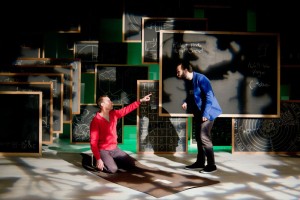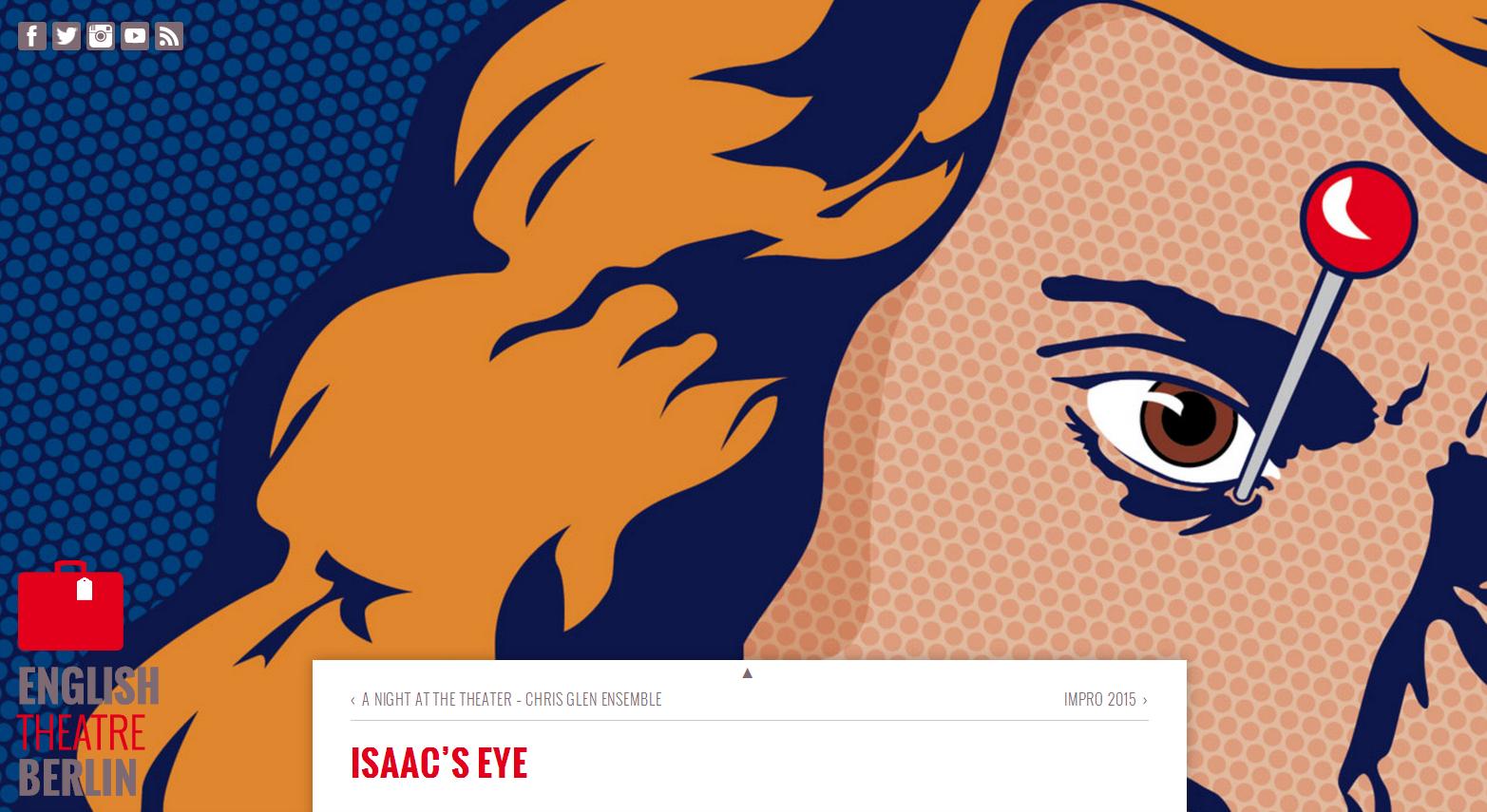Needle into the eye – Issac Newton’s experiment on light’s consistency at the English Theatre Berlin
It is a challenging task to take the world of science as a base for a scenic play. Not only because it is hardly achievable to bring complex research matters across in a facile way so that they are intuitively understandable to a wider crowd. Foremost, it must be difficult to attract people to a theatre play that elaborates on a social kind of people that in cliché like to be drowned under paper, journals and books in a lonely university lab. But truly, who has not heard of Newton. Isaac was his first name. Yes, it’s the guy with the apple who used that very same fruit to prove his findings on gravity.
So interestingly the English Theatre in Kreuzberg is stuffed with people that night showing a great curiosity on what Newton’s life might had been like. Entering the theatre room the play has already somehow commenced one might think. Someone stands on a ladder scribbling on a school board with white charcoal. The room is actually packed with such boards that contain all kinds of researcher’s favorites like graphs, functions, equations and lines with loads of angles. In another corner a heavy bearded man is playing the guitar and singing giving the scene some remote day-dream atmosphere. It fits pretty well to what most of us would think about researchers – like seeing them live in their own world not taking notice of what happens around. A bit or a bit more autistic we would guess they are.
Jeffery Mittlemen acts in a multi-personal role. He is not only the sick poor being who will eventually die during the play. He acts also as a narrator. So once the audience’s voices have calmed down he takes over and introduces the first act. We are at Isaac Newton’s home sometime in the 17th century. Isaac has some relationship with Catherine who seems to be his girlfriend but they have totally contradicting viewpoints on that and life in general. This will become obvious sooner than later. Isaac is unambiguously driven by the will to become famous for his as he is convinced beyond-anything-research. In fact he sees himself in direct contact with god, who enlightens him on the algorithms behind the determinants of life on earth. Among them is for instance light itself. It is still uncovered what light is actually made of technically speaking. Catherine thinks that Isaac is somehow strange but she also likes the big thoughts that circle in his head. She believes though that also Isaac will moderate his energy devoted to science and shift more focus on life’s basics. She wants to marry and have kids and that is also what she makes pretty clear to him.
Isaac (Logan Verdoorn) has one dream that needs to come true very soon. He must join the Royal Society. So Catherine (Mary Kelly) asks him if he will take her to London as well if he gets the invitation. He answers that with some sort of yes – not wanting to lose her but clearly more thinking of his own endeavors. Catherine can convince Isaac to contact Robert Hooke a famous scientist of these days and leading member of the Royal Society. The decision that Isaac would take her to London is like a (wedding) proposal to her – now she wants to close in on that.
The fire in the play starts to lighten up when Robert Hooke (Ben Maddox) visits Newton in his country house. As he read through Isaac’s papers he was actually more than astonished that they seemingly investigate the same fields of natural science. Even worse though Isaac’s states some very opposing thoughts which he says he has already proven with experiments. Robert Hooke is obviously more scared to lose in importance or being replaced by an Isaac type of guy that his first ambition is to stop him from hitting public surface. Proposals to enjoy the country live and dedicate more time to a lovely wife and cute children as he has missed and strongly regrets dissolve into thin air. In a second approach he demands Isaac to respect him as a living legend in science listing his publications and even a scientific law that has been named after him. However, Isaac is anything but impressed and shows no considerations to step back on his will to enter the Royal Society.
 The true and loud argument evolves over the both sided investigated question on the substance of light. Isaac states his finding that light is made of particles as the single truth. His reasoning is that light passing through a block of glass is split into different colors implying that light itself is the collection of all colors. But the only way to prove it at this time Isaac says is to stick a needle under one’s eyeball pushing it up. That should result in a change of observed colors. Robert and Isaac argue about theory and experiment settings. And as it seems Isaac is not able to sustain his theory under public experiment things get nasty our today’s language would say. Digging through Robert’s personal life he brings up material to blackmail him. Nonetheless, Robert is fighting back not with less success. A shocking insight into truly decorated vitas comes alive that makes this thought to be dry science story a real cat fight. Luckily, Jeffrey Mittleman helps to differentiate between fact and fiction. Thus, it stays a lively play without discrediting the scientists unfairly.
The true and loud argument evolves over the both sided investigated question on the substance of light. Isaac states his finding that light is made of particles as the single truth. His reasoning is that light passing through a block of glass is split into different colors implying that light itself is the collection of all colors. But the only way to prove it at this time Isaac says is to stick a needle under one’s eyeball pushing it up. That should result in a change of observed colors. Robert and Isaac argue about theory and experiment settings. And as it seems Isaac is not able to sustain his theory under public experiment things get nasty our today’s language would say. Digging through Robert’s personal life he brings up material to blackmail him. Nonetheless, Robert is fighting back not with less success. A shocking insight into truly decorated vitas comes alive that makes this thought to be dry science story a real cat fight. Luckily, Jeffrey Mittleman helps to differentiate between fact and fiction. Thus, it stays a lively play without discrediting the scientists unfairly.
Malte Raudszus


No comments yet.